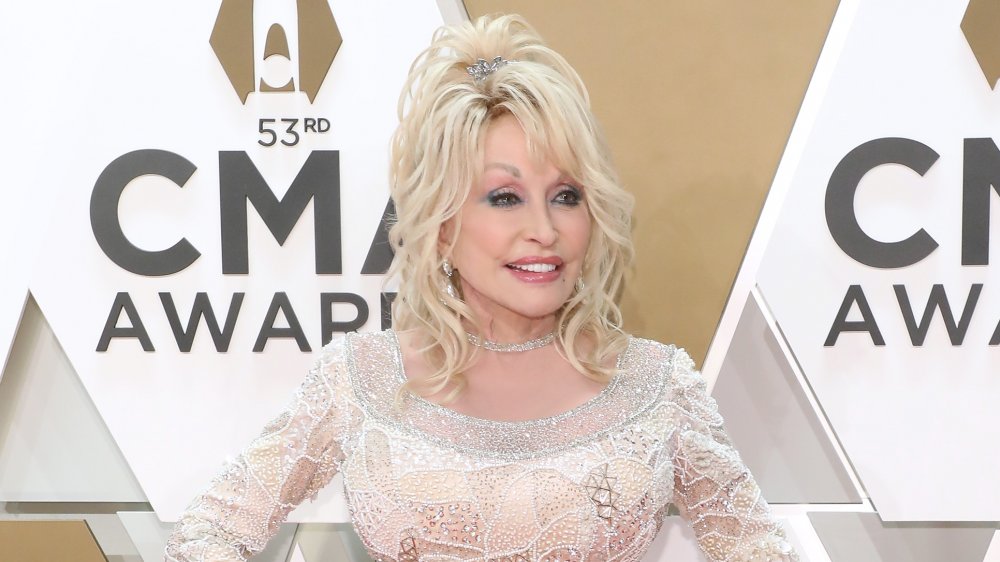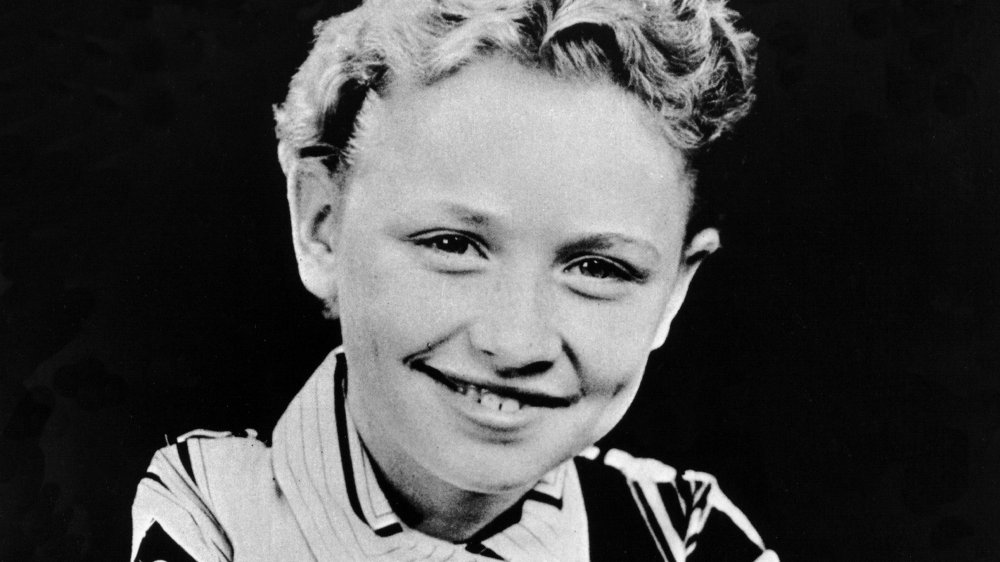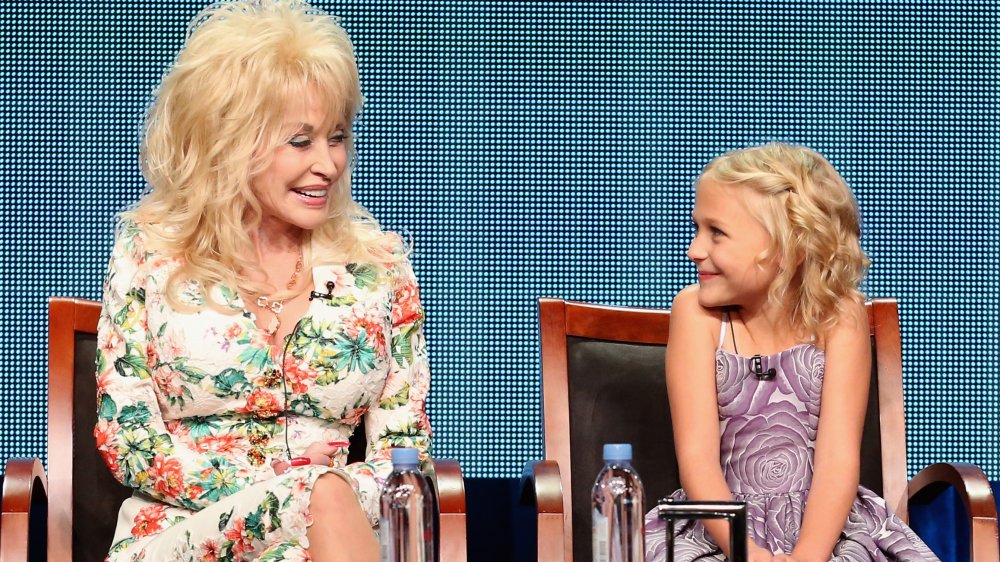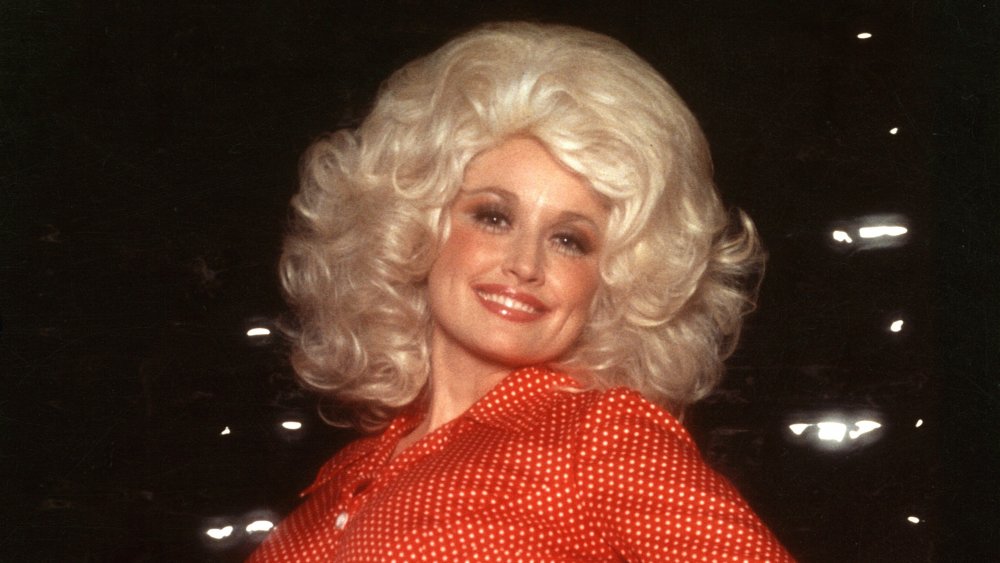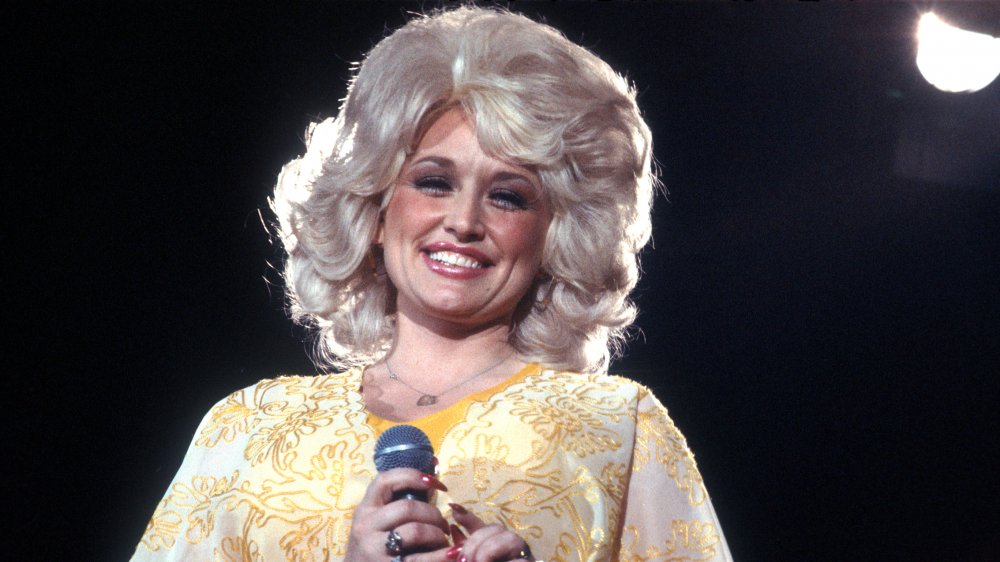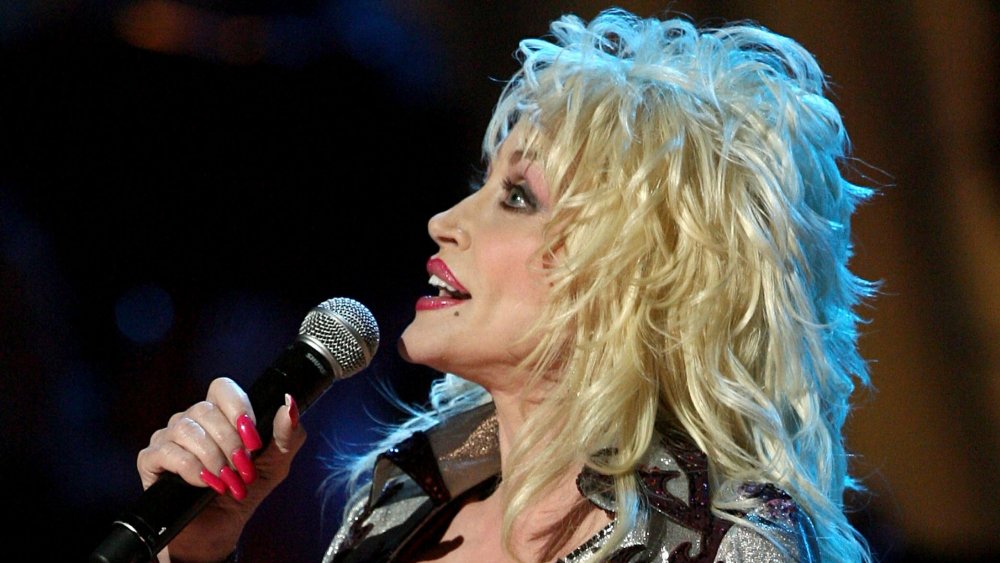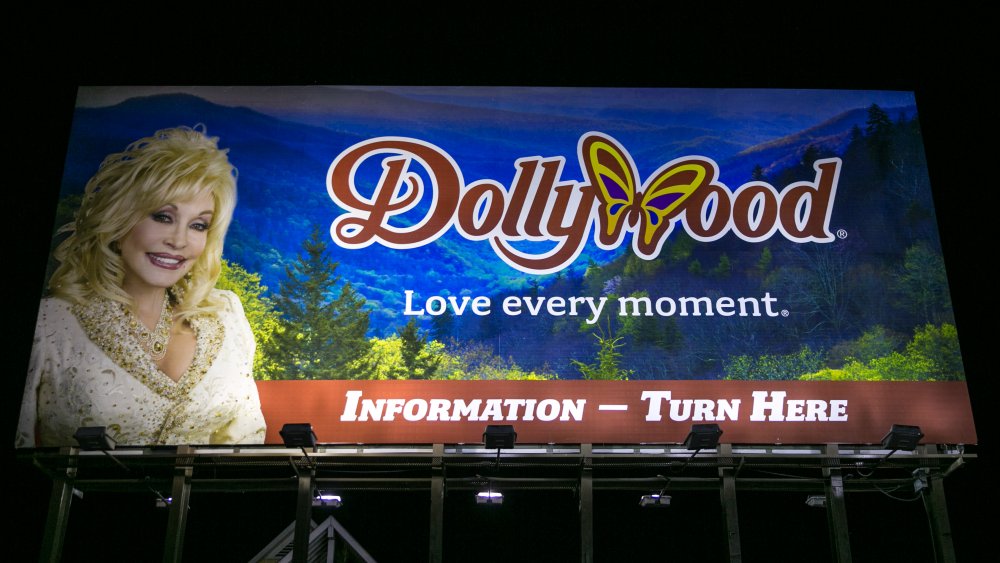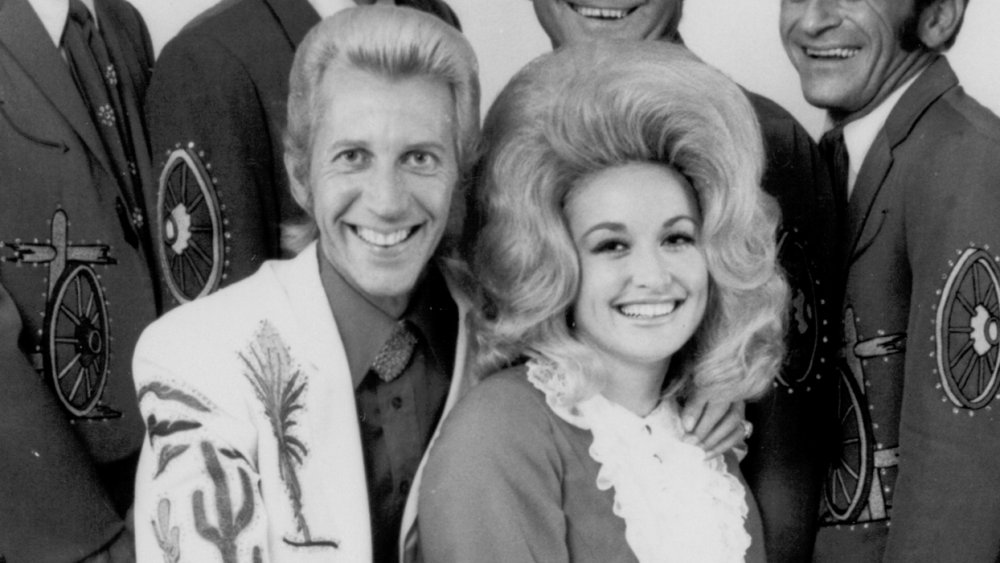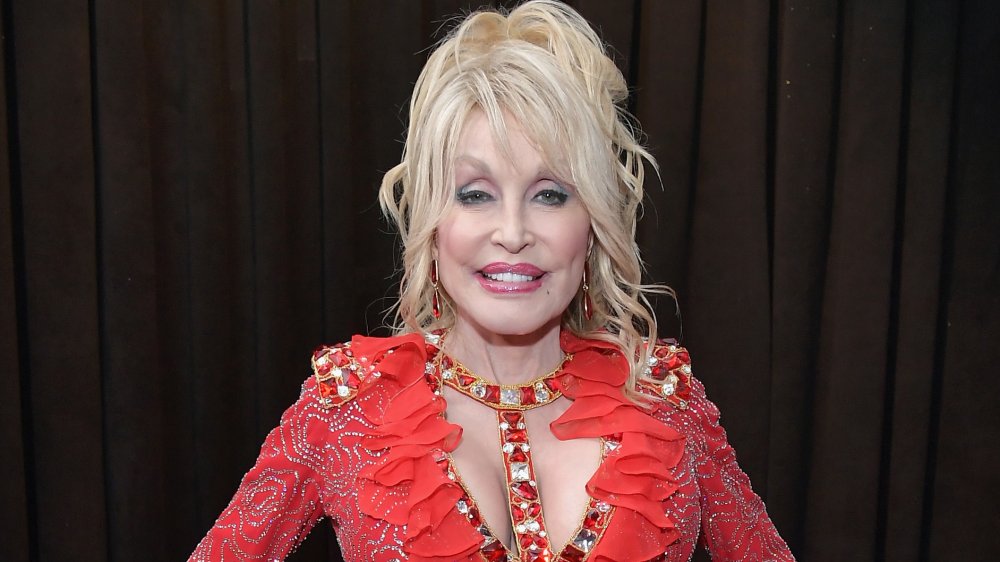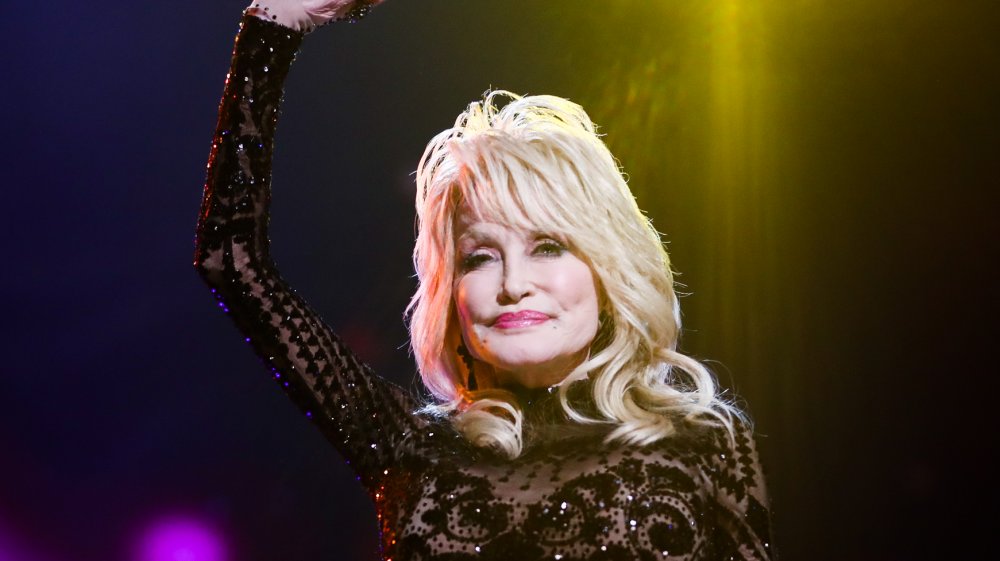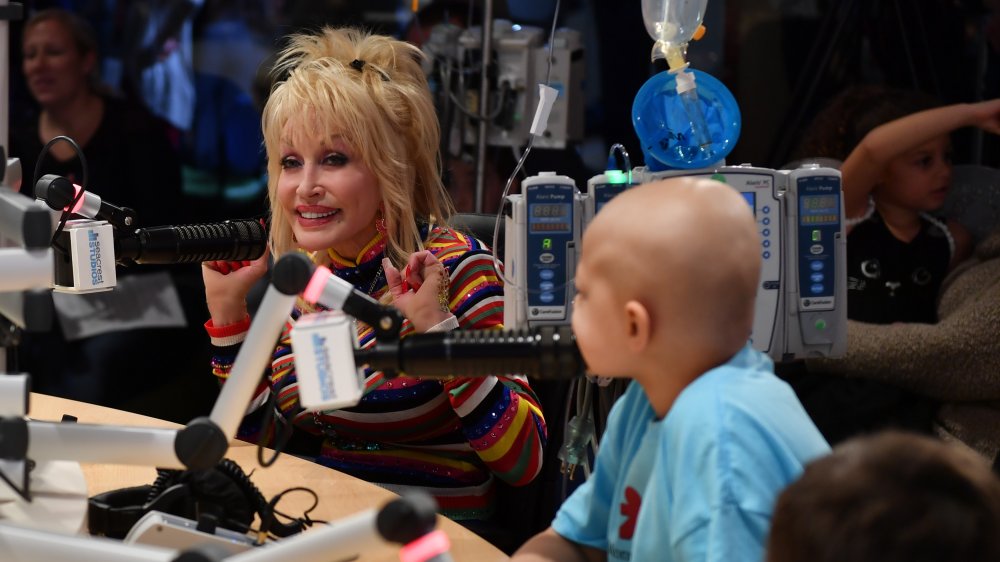Dolly Parton Has Led A Tragic Life
Country music icon Dolly Parton is as universally known for her candid artistry as she is for her cheerful personality and larger-than-life appearance. At a time when country music was just beginning to embrace female voices, she carved out a name for herself, writing her own music, earning nine Grammy Awards throughout her career, and portraying iconic roles in blockbuster films such as 9 to 5 and Steel Magnolias. Dolly has even managed to ascend to "legend" status thanks to her own theme park, Dollywood, and her charity, Dolly Parton's Imagination Library, which has donated over 140 million books to children across the world.
The spiritual singer would likely be the first to tell you that she's blessed, and while some of her biggest hits like "Islands in the Stream," "Here You Come Again," and "Two Doors Down," are jovial and imaginative affairs, Parton's good fortune hasn't come without hardship.
Before her rise to fame in the '60s and even since she's become a global superstar, the Country Music Hall of Fame inductee has lived through her fair share of tragedy, both professional and personal. There's a reason why the eloquent songwriter is credited with saying, "If you want the rainbow, you gotta put up with the rain." Here is Dolly Parton's tragic life.
As one of 12 kids, her childhood was far from idyllic
Dolly Parton had a tough childhood, although you'd hardly tell from her catalog of romantic, homespun songs like "My Tennessee Mountain Home" boasting of life "as peaceful as a baby's sigh." In actuality, Parton and her siblings lived in a two-bedroom cabin in Locust Ridge, Tenn., with no electricity or running water. A recreation of the home, which had one bed and kitchen table inadequate for the sizable family, resides at Dollywood, where the singer writes it has "a special place in [her] heart" (via Curbed). According to Parton's website, her mother, Avie Lee, took care of the 12 kids, instilling in them the importance of "[making] the best" with what you had. Although Parton's father, Robert Lee, was illiterate, the singer remembers him as "one of the most intelligent men she's ever known." He worked hard to support the family.
The Partons had their methods of making ends meet. In her memoir, Dolly's younger sister, Stella, recounts her father bribing a doctor with "a bag of grain" to deliver Dolly when they could not afford it (via Daily Mail). Tragedy hit the poverty-stricken family in 1955 when Parton was only 9-years-old and her younger brother, Larry, died four days after his birth. "There is a lot of heartache and stuff that goes on with that," Parton told TV critics in 2015 (via Fox News). "[But] that is what makes you who and what you are."
Her family's poverty inspired some of her biggest hits
Dolly Parton's hard-knock adolescence could have steered her one direction, but her family maintained their optimism. "We never thought about being bitter," Parton told Parade in 2015. "We didn't even know we was poor until some smart aleck up and told us." When the singer recalled bathing in the river during summer and using a pan of water in the winter in 2017's Dolly on Dolly: Interviews and Encounters with Dolly Parton, she even had a positive outlook on her siblings wetting the bed, calling it "the only warm thing we knew in the wintertime."
This unbridled positivity led to some of her biggest country hits like "In the Good Old Days (When Times Were Bad)" and "Coat of Many Colors," which inspired a 2015 made-for-TV movie. The latter evokes the biblical tale of Joseph and his colorful tunic as Parton's mother sews together fabric scraps to craft her a coat. "Mama made you feel better about things, making life more beautiful than it really was," Parton told Parade of the song, which finds her taking pride in her mom's efforts despite getting bullied. The song — and its philosophy that "One is only poor, only if they choose to be — is one of her favorites, and she told Vogue in 2016, her "Cinderella, rag-to-riches story" is part of her appeal and the track "made [her mother] look like the hero she is."
Success as a musician did not come easy for Dolly Parton
Dolly Parton had a knack for music at an early age, accompanying her Uncle Bill Owens on trips to Nashville at age 10 before moving there after high school in 1964 (via Larry King Live). Owens was instrumental in helping Parton establish herself, and the two secured a deal with Monument Records in 1965. Unfortunately, it didn't amount to much. Parton's first singles "I Wasted My Tears" and "What Do You Think About Lovin'" didn't take off, and "Happy, Happy Birthday Baby" peaked at a mediocre No. 108 on pop charts.
According to the crooner's website, After Parton and Owens wrote 1966's "Put It Off Until Tomorrow" for Bill Phillips, it seems Monument allowed the singer to embrace her southern sensibilities for her first solo album, 1967's Hello, I'm Dolly. Its bubbling success was surprising, considering she was "largely an unknown female artist," and it only propelled Parton further. The record helped land her "big break," as she told Larry King, garnering the attention of Porter Wagoner and Nashville's "biggest syndicated show."
However, Parton and Owens are not keen on letting anyone hitch a ride on their success. In her memoir, Stella Parton recounts Owens discouraged her from pursuing music because it would "hurt Dolly's music career," adding that her sister "found every reason in the world to keep me as far away as possible and ... I finally gave up and let her have it" (via Daily Mail).
Her initial success in the industry made her unhappy
As a woman in a misogynistic industry, Dolly Parton had to do things she didn't want to at the early stages of her career. After seven years on Porter Wagoner's variety show, Parton had established enough success to go solo. "I didn't want to just be somebody's girl singer forever," she revealed on Larry King Live. Still, her solo endeavors had some missteps, including her own short-lived syndicated show, Dolly!, which ran for a season in the '70s. In a 2018 interview with Billboard, the singer told Linda Perry that she carries no regrets, although the show was a "mistake." Parton said it was "not good," and she was very unhappy during its production, adding, "it wasn't what I wanted it to be and I wasn't able to be my own self in it."
Apart from the show, it seems Parton also took issue with her earlier, more commercial material. While she wrote half the songs on 1980's 9 to 5 and Odd Jobs, she admitted to Rolling Stone the same year that she didn't like her last few albums, although they "got [her] where [she] wanted to be." At the time, people thought she "sold out," but Parton believed she was "tryin' to accomplish the right thing." Following the success of "9 to 5" and its accompanying film starring Parton, Lily Tomlin, and Jane Fonda, the singer felt that she finally had "the freedom" to make music her way.
Her baby brother Floyd Parton also lived 'a short life'
In December 2018, Dolly Parton's family was dealt another blow when her younger brother, Floyd Parton, passed away at 61-years-old. Remembered as "a renaissance man" with "many talents and areas of knowledge" in his obituary at Tennessee's Atchley Funeral Home, Floyd and Dolly had a close relationship during his lifetime. Together, the two siblings had penned some of her biggest No. 1 hits, including 1991's "Rockin' Years," which featured Ricky Van Shelton, and 1978's "Nickels and Dimes" from Parton's Heartbreaker LP.
The loss was devastating for Parton, who hasn't discussed her brother's passing publicly aside from a 2018 joint statement with her family to People. "He lived a short life of love and beautiful songs," the family wrote, adding that they "sang his lovely song 'Rockin Years' together as a family at the service to say goodbye to him." Losing family members over the years has been difficult for Parton, who admitted to WENN that after her mother passed in 2003, she couldn't perform "Coat of Many Colors" for "probably three to six months without crying" (via Country Rebel).
Her theme park Dollywood has had its own disasters
Inspired by her time in Hollywood, Dolly Parton redeveloped a Tennessee theme park into a Smoky Mountain celebration called Dollywood in 1986. While its success led to a new water park and its website boasts that it's the "largest ticketed attraction in Tennessee" and one of the area's biggest employers, the business has not come without problems. On the opening day of its Thunder Express roller coaster in 1989, Associated Press reported that 18 people were injured after a brake malfunction.
Unfortunately, guest injuries continued to be a recurring problem. In 2004, a woman visiting from out of state "fell from a moving train car," according to WATE, although officials ruled Dollywood was not at fault. The park's Timber Tower ride was also eventually removed, following reports from Coaster Critic that the ride malfunctioned, leaving 44 riders stranded for hours until they were rescued in 2007. In 2015, TMZ reported a woman was suing Dollywood after claiming she was "suffering brain damage" after falling from a ride, although the two parties later settled.
The park made headlines yet again in 2018 when, according to TMZ, a mother of two sued the park for $2 million after injuring her spine at the waterpark. WREG reported that a "themed decoration" had fallen and hit guests, sending three people to the hospital "in stable condition." According to WATE, Parton is informed about park accidents as she considers "every visitor a family member."
At this age in her life, Dolly Parton has lost many of her friends
After a decade-spanning career, Dolly Parton has seen a fair share of her contemporaries pass away. The loss of country singer Porter Wagoner, who helped kick start her career, was particularly hard. She even penned 1973's "I Will Always Love You" — which Whitney Houston re-recorded for 1992's The Bodyguard — about their professional split. Parton and Wagoner had made up by the time he passed from lung cancer in 2007, and she believes (via The Guardian) that "part of him will always live through me and my music." Even more heartbreaking, Parton sang to Wagoner on his deathbed, saying, "It felt good that I had the opportunity to say goodbye properly."
In 2017, The Detroit News reported that her longtime manager Don Warden had died of unknown causes. After working together for almost 50 years, Parton called him "Mr. Everything." In a post on her website, she described him "like a father, a brother, a partner, and one of my best friends."
The loss of country singer Kenny Rogers, who died in 2020 of natural causes, also "shocked" her, she told the TODAY. The two duetted on hits like "Islands in the Stream," and after his death, Parton said on Facebook that her "heart's broken, and a big ol' chunk of it has gone with him today."
An affair in the '80s led Dolly Parton to contemplate suicide
With her ever-present smile, glamorous looks, and hopeful aura, Dolly Parton is nothing short of a ray of sunshine most days, however, 2017's interview collection Dolly on Dolly revealed that the singer experienced some especially turbulent times during the '80s. After an "affair of the heart" during her "seemingly open marriage," Parton was suicidal. "For about six months there I woke up every morning feeling dead," she said. At this point in her career, she was also navigating family drama, health issues, and reeling from a "nightmare" experience on-set of The Best Little Whorehouse in Texas.
After binge-eating, canceling her tour, and falling into a deep depression, Parton recalled one day eying a handgun in her house before her dog Popeye came looking for her. "The tap-tap-tap of his paws jolted me back to reality," she said, noting that she put the gun down and took a moment. She believes her dog was a "spiritual messenger," adding, "I kind of think it was God's way of bringing me to my knees long enough to pray."
If you or someone you know is having suicidal thoughts, please call the National Suicide Prevention Lifeline at 1-800-273-TALK (8255) or text HOME to the Crisis Text Line at 741741.
Dolly Parton tried to help her niece before a tragic overdose
After struggles with addiction and losing custody of her son, R Online reported in 2017 that Dolly Parton's niece, Tever Parton, had died at 36-years-old after an overdose, claiming that Dolly had been "too sick to travel" to the funeral. Earlier that year, the outlet had previously reported on Tever's battle with drugs and her family's attempts at helping her, revealing a 2006 arrest after attacking her boyfriend's sick mother for money to buy drugs (R Online claims that the Sevierville police "mysteriously 'lost'" the report) as well as a stint in rehab that Dolly footed the $25,000 bill for.
Understandably, Dolly and her family have been very private about the loss and its circumstances. The singer has not publicly spoken about the death of her niece, and Tever's obituary (at the same cemetery where Parton's brother Floyd is buried) vaguely notes that Tever is survived by her son, parents, sister, and "several aunts, uncles, and cousins."
She raised her siblings but was unable to have kids of her own
Dolly Parton and her husband Carl Dean have been happily married since 1966, although they never had any children of their own. "I wanted children when we first met. All girls do," Parton revealed on Larry King Live in 2003. "But that did not happen."
The couple had their hands full when they first met, raising five of Parton's younger brothers and sisters who they also put through school. However, their plans for a family of their own took a backseat in 1982 when Parton was rushed to the hospital for a "partial hysterectomy related to her endometriosis" (via Huffington Post). After realizing she would never be able to have children, Parton fell into a deep depression. She told the Globe (via Irish Examiner) that it was "an awful time," adding, "Every day I thought, 'I wish I had the nerve to kill myself.'"
While she admitted they "talked" about adoption, Parton told King that she's not sure she would have "been a good parent, because I've got my mind so somewhere else." Looking back in hindsight, she mused to TODAY that "God has a plan for everything." It turns out that giving back to children through her charity, Imagination Library has been more than enough for the star who believes "it probably was his plan for me not to have kids so everybody's kids could be mine."

